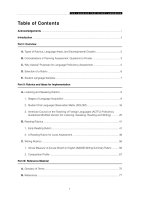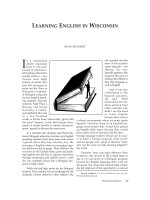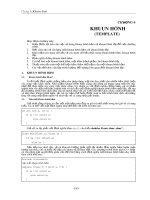Tài liệu UNIT 6: INTERESTING CHARACTERS doc
Bạn đang xem bản rút gọn của tài liệu. Xem và tải ngay bản đầy đủ của tài liệu tại đây (89.32 KB, 7 trang )
UNIT 6: INTERESTING CHARACTERS
1 READING
1 interest /’IntCrest/ noun
1 [singular or uncount] a feeling of wanting to know about or take part in something: sự tò mò, sự quan tâm, sự thích
thú
interest in: an interest in politics
2 [count often plur al] an activity that you enjoy doing when you are not working: sở thích
Tell us about your interests and hobbies.
2. ex- /eks-/ (prefix) used with nouns that describe someone’s job, rank, or relationship to someone, showing that they do
not have that job, rank, or relationship any more: trước, nguyên, cựu
ex-wife: vợ trước
ex-President: nguyên tổng thống
3. fit into phrasal verb [intransitive never progressive] to be suitable or similar enough to belong to a group: khớp với
His writing did not fit into any traditional literary category.
4. broadly/generally speaking used for showing that what you are saying is usually true, but not in every instance: nói
chung
Generally speaking, pet owners are law-abiding citizens.
5. wrong /rON/ noun [uncount] behavior that is morally wrong or that breaks a rule: cái xấu, cái sai
do wrong: Anyone who does wrong will be punished.
right and wrong: Small children do not know the difference between right and wrong.
wrong (adj) not accurate or correct: INCORRECT: sai
We must have gone the wrong way.
6. likely /laIklI/(adj) probably going to happen, or probably true: có khả năng
The most likely cause of the fire was a cigarette.
likely that: It seems likely that interest rates will increase.
likely (adv) probably: có khả năng
They’ll quite likely ask you to pay a small deposit.
7. show or show up [intransitive] INFORMAL to arrive in a place where people are expecting you: có mặt, xuất hiện
We didn’t think Austin would show.
8. in time early enough: kịp lúc
in time to/for: I want to be home in time for tea.
9. on time arriving at the correct time and not late: đúng giờ
The train was on time.
10. opposed /C’pCUzd/ (adj) someone who is opposed to something thinks it should not happen or should not be done:
chống đối, phản đối
opposed to: He was bitterly opposed to the war.
be opposed to doing something: Some residents were opposed to naming the high school after Martin Luther
King.
as opposed to used for referring to something that is very different from what you have just mentioned: trái với,
tương phản vớI
I am here on business as opposed to a holiday: Tôi đến đây vì công việc kinh doanh chứ không phải để đi nghỉ.
oppose /C’pCUz/ verb [transitive] to disagree with or disapprove of a plan or policy: chống đối, phản đối
a group that opposes the use of the death penalty in all cases
opposition [noun, uncount] strong disagreement with a plan or policy, especially when this is shown in active
attempts to prevent something: sự chống lại
opposition to: Public opposition to the military government is growing.
11. like /laIk/ verb [transitive not usually progressive] to enjoy doing something or to feel that someone or something is
pleasant or attractive: thích
like doing something: I like going out to parties with friends or watching TV.
like to do something: He always liked to sleep late on Sundays.
1
like (pre) (followed by a noun): giống
He looks like his father.
like (conj) (connecting two clauses): giống
She looked like she was about to cry.
12. apparent /C’pArent/ (adj) an apparent quality, feeling, or situation seems to exist although it may not be real: vẻ bề
ngòai, không thật
Their affluence is more apparent than real: Sự giàu có của họ là bề ngòai hơn là thật.
apparently /C’pArCntlI/ (adv) used for saying what seems to be true when people do not yet know all the facts
of a situation: hình như
Apparently they are getting divorced.
13. local /’lCUkl/ adjective [usually before noun] in or related to the area you live in, or to the particular area you are
talking about: (thuộc) địa phương
Ask for the book in your local library.
local [noun, count] [usually plural] someone who lives in a particular place, rather than a visitor to that place: dân
địa phương
The locals are very welcoming.
14. no longer/not any longer used when something happened or was true in the past but is not true now: không … nữa
We’re no longer friends: Chúng tôi không còn là bạn nữa.
15. entertain /,entC’teIn/ verb [transitive] to give a performance that people enjoy: giải trí, tiêu khiển
He entertained us for hours with his stories and jokes: Anh ta đã giảI trí cho chúng tôi hang tiếng đồng hồ bằng
những chuyện kể và câu đùa của mình.
entertainment oun [count or uncount] performances that people enjoy: cuộc tiêu khiển, cuộc giải trí
A jazz band provided the entertainment, while people ate and drank under the stars.
entertaining (adj) enjoyable or fun to do: thú vị
The book is short but entertaining.
entertainingly (adv)
16. help out phrasal verb [intransitive or transitive] MAINLY SPOKEN to help someone, especially by doing a particular job or
by giving them money: giúp ai (nhất là trong tình huống khó khăn hoặc trong cơn khủng hỏang)
My family has always helped me out.
help out with: He always helped out with the housework.
17. share /SeC(r)/ verb [transitive] to allow someone to use or have something you own: chia sẻ
He would never share his toys with me.
share a room: dùng chung phòng
share noun [count usually singular] a part of a total number or amount of something that is divided between several
people or things: phần
a fair share of the food: phần thức ăn vừa phải
18. skydiving /’skaIdaIvIN/ noun [uncount] the sport of jumping out of an airplane and falling for as long as possible
before opening your PARACHUTE: môn thể thao nhảy tự do từ trên máy bay xuống
4 LISTENING
19. guy /gaI / noun [count] INFORMAL a man: anh chàng
Bob’s a really nice guy, isn’t he?
20. accounting /C’kaUntIN/ [noun, uncount] the work of accountants or the methods they use: kế tóan
a new accounting system
accountant /C’kaUntCnt/ noun [count] someone whose job is to prepare financial records for a company or
person: nhân viên kế tóan
21. kind of SPOKEN used when you are talking about someone or something in a general way without being very exact or
definite: đôi chút, phần nào
I’m not sure why, but I feel kind of sorry for him: Tôi không dám chắc tại sao, nhưng tôi cảm thấy phần nào tiếc cho
anh ta.
2
22. touch /tVtS/ verb [transitive] to put your hand or part of your body on someone or something: đụng, chạm
Beth reached out and touched his cheek.
touch noun [count usually singular] the action of putting your hand or part of your body on someone or something:
hành động đụng, chạm
The touch of his hand sent a thrill through her body.
keep/stay in touch (with someone) to continue to write or speak to someone although you do not see them
often: giữ liên lạc
They moved away five years ago, but we still keep in touch.
get in touch (with someone) to speak or write to someone, especially after you have not spoken to them for a
long time: liên lạc
Why don’t you get in touch with Jerry and tell him the news?
23. separate /’seprCt/ (adj) not together or joined to something else: riêng, riêng rẽ
My brother and I always had separate rooms.
separate from: Clients’ funds should be kept separate from the firm’s own money.
separately (adv)
They are now living separately: Bây giờ họ sống riêng.
separate /’sepCreIt / verb [transitive] to keep people or things apart from each other: tách ra, chia ra
separate someone from someone: The child may be separated from his mother while she receives treatment.
separation noun [uncount] the act of separating two or more things, or the fact that they are separated: sự chia
tách
separation from: Quebec wanted some form of separation from the rest of Canada.
24. get along or get on or get on with if people get along, they like each other and are friendly to each other: ăn ý, có
quan hệ tốt
Richard and his sister don’t get along.
get along with: I get along well with most of my colleagues.
25. otherwise /’VDCwaIz/ (adv) in a different or opposite way from what has been mentioned: nhưng, mặt khác
The rent is high, (but) otherwise the house is fine: Tiền thuê cao, (nhưng) mặt khác thì ngôi nhà này rất đẹp.
26. hike /haIk/ verb [intransitive or transitive] to go for a long walk in the countryside: đi bộ đường dài
Soldiers had to hike nearly 20 miles through the swamps.
hike noun [count] a long walk in the countryside: cuộc đi bộ việt dã
We went for a hike through the woods on Sunday.
take a hike: Let’s take a hike tomorrow.
hiking /haIkIN/ noun [uncount] the activity of walking for long distances in the countryside: việc đi bộ đường dài
hiker noun [count]
27. familiar /fC’mIlIC/ (adj) well known to you or easily recognized by you: quen thuộc
familiar to: The name Harry Potter will be familiar to many readers.
familiarity /fC’mIlI’ArCtI/ [uncount] the fact that something is well known to you or easily recognized by you:
sự hiểu biết rõ về cái gì
His familiarity with the local languages surprised me.
28. deride /dI’raId/ verb [transitive] FORMAL to criticize someone or something by suggesting that they are stupid,
unimportant, or useless: nhạo bang
He derided his efforts (as childish).
29. dusk /dVsk/ noun [uncount] the period of time at the end of the day just before it becomes dark: lúc chạng vạng
The park closes at dusk.
dusky (adj) LITERARY not very bright: mờ tối
the dusky light in the cave: ánh sang lờ mờ trong hang
30. dawn /dc:n/ noun [count or uncount] the beginning of the day, when it begins to get light: bình minh, rạng đông
They had decided to leave at dawn.
dawn verb [intransitive] if a day or morning dawns, it begins to get light: bắt đầu sáng
The big day dawned with a howling wind and heavy rain.
31. gonna /’gOnC/ short form of “going to”
I think I’m gonna / going to need some help.
3
32. gotta /’gOtC/ short form of “got to”
He’s gotta / got to decide now.
9 LISTENING
33. personality /,pE:sC’nAlCtI/ [noun, count or uncount] the part of a person that makes them behave in a particular
way in social situations: nhân cách, tính cách
He has a very outgoing personality and makes friends very easily.
34. assessment /C’sesment/ noun [uncount] the process of making a judgment or forming an opinion, after considering
something or someone carefully: sự đánh giá
The investigation was reopened after careful assessment of new evidence.
assess /C’ses/ verb [transitive] to carefully consider a situation, person, or problem in order to make a judgment:
đánh giá
We tried to assess his suitability for the job.
35. potential /pC’tenSl/ (adj) [only before noun] possible or likely in the future: tiềm năng, tiềm tàng
The disease is a potential killer.
potential [noun, uncount] the possibility to develop or achieve something in the future: khả năng, tiềm lực
Our common goal is to maximize our potential for economic growth.
36. quiz /kwIz/ noun [count] a competition in which you answer questions: cuộc thi đố
quizzes (plural)
37. graphology /grC’folCdZI/ noun [uncount] the science of studying people’s HANDWRITING to learn about their
character: thuật xem tướng chữ
38. take someone/something seriously to think that someone/something is important and should be given careful
attention: coi trọng, coi là nghiêm túc
Jonathan takes his gardening very seriously.
39. compatible /kCm’pAtCbl/ (adj) likely to have a good relationship because of being similar: hợp
compatible with: You find yourself married to someone with whom you’re not compatible.
compatibly (adv)
compatibility [noun, uncount]
40. phrenology /frC’nOlCdZI/ noun [uncount] the study of the shape of someone’s head, believed in the past to be a
way of finding out about their character: khoa tướng sọ
41. bump /bVmp/ noun [count] a raised part on your skin where you have been injured: cái bướu hoặc chỗ sưng u
Her body was covered in bumps and bruises.
bump verb [transitive] to accidentally hit part of your body against something, making it hurt: va chạm hoặc đập cái
gì (nhất là một bộ phận cơ thể) vào cái gi
bump one’s head (on the ceiling)
42. educate /’edZUkeIt/ verb [transitive often passive] to teach someone, usually for several years, especially at a
school, college, or university: gíao dục
She was educated at Smith College and Yale Law School.
educated /’edZUkeItId (adj) an educated person has received a good education and has a lot of knowledge: đã
được đào tạo, giáo dục
well educated: The people who work here are well educated and open-minded.
education /,edZU’keISn/ noun [uncount] the activity of educating people in schools, colleges, and universities,
and all the policies and arrangements concerning this: sự giáo dục, nền giáo dục
have/get an education: He wants his children to have a good education.
a college education: She was the first in her family to get a college education.
43. at the/that/this time: vào lúc đó
I was sitting by the window at the time.
4
11 VOCABULARY
44. outgoing /’aUtgCUIN/ (adj) someone who is outgoing is friendly and enjoys meeting and talking to people:
SOCIABLE: thân mật và thỏai mái
Norm is very shy but his wife’s outgoing.
45. enthusiastic /In,Tju:zI’AstIk/ (adj) very interested in something or excited by it: nhiệt tình
Business leaders gave an enthusiastic welcome to the proposal.
— opposite UNENTHUSIASTIC
enthusiastically (adv)
enthusiasm /In’Tju:zIAzCm/ noun [uncount] the feeling of being very interested in something or excited by it:
sự nhiệt tình
enthusiasm for: His enthusiasm for music has stayed strong throughout his 23 years in radio.
46. shy /SaI/ (adj) nervous and embarrassed in the company of other people, especially people you do not know: nhút nhát,
e lệ
Archie was shy and awkward.
shyly adv
Kevin and Ashley smiled shyly at each other.
shyness noun [uncount]
47. honest /’OnIst/ (adj) a person who is honest does not tell lies or cheat people, and obeys the law: thật thà, lương thiện
Most young people are decent and honest.
— opposite DISHONEST
honestly adv
She was trying to do her job honestly and fairly.
honesty /’OnIstI/ noun [uncount] an honest way of behaving, speaking, or thinking: sự trung thực, thực thà
There is a refreshing honesty about his work.
48. generous /’dZenCrCs/ (adj) giving people more of your time or money than is usual or expected: rộng rãi, hào
phóng
generous to: Billy was very generous to people who had less than he did.
generous with: Lawyers have been generous with their time and talents.
generously adverb:
They gave generously to local charities.
generosity [noun, uncount] kindness, especially in giving things to people: tính rộng lượng, hào phóng
He was known for his generosity to his colleagues.
49. ambitious /Am’bISCs/ (adj) determined to be successful, rich, famous, etc.: tham vọng
an ambitious young lawyer
ambitiously adv
ambition /Am’bISn/ noun [uncount] the feeling that you want very much to become successful, rich, famous,
etc.: tham vọng
a young woman with drive and ambition
ambition to do something: It had been my lifelong ambition to coach a leading team.
50. stubborn /’stVbCn/ (adj) a stubborn person is not willing to change their ideas or consider anyone else’s reasons or
arguments: bướng bỉnh, cứng đầu
a stubborn look/voice/chin
stubbornly adv
They stubbornly refuse to admit there’s a problem.
51. patient /’peISnt/ (adj) someone who is patient is able to wait for a long time or deal with a difficult situation without
becoming angry or upset: kiên nhẫn
patient with: Susan’s very patient with the children.
— opposite IMPATIENT
patiently adv
patience /’peISns/ noun [uncount] the ability to wait for a long time without becoming angry or upset: sự kiên
nhẫn
Have patience, he’ll be there soon.
5
13 READING
52. eccentric /Ik’sentrIk/ (adj) someone who is eccentric often behaves in slightly strange or unusual ways: khác thường,
lập dị
She’s regarded as being rather eccentric.
eccentrically adv
eccentric noun [count] someone who behaves in an eccentric way: người lập dị
eccentricity /,eksen’trIsCtI/ noun [uncount] strange or unusual behavior: sự lập dị
Mrs. Morton was well known for her eccentricity.
53. conventional /kCn’venSCnl/ (adj) [usually before noun] of the usual, traditional, or accepted type, instead of being
new and different: thông thường
You can cook the meat either in a microwave or in a conventional oven.
— opposite UNCONVENTIONAL
conventionally adv
54. embrace /Im’breIs/ verb [transitive] FORMAL to completely accept something such as a new belief, idea, or way of
life: chấp nhận
Most countries have enthusiastically embraced the concept of high-speed railroads.
55. label /’leIbl/ (present participle labeling or labelling; past tense and past participle labeled or labelled) verb
[transitive]
1 to put a label on an object: dán nhãn
These three bottles must be clearly labeled “Poison.”
2 to use a word or phrase to describe someone or something, especially one that is not completely fair or true:
BRAND: xếp lọai, gán cho
label someone something: Her latest movie has been labeled a disaster by the critics.
label noun [count]
1 a piece of paper or material fastened to an object that gives information about it: nhãn
Read the washing instructions on the label.
2 a word or phrase that is used to describe someone or something, especially one that is not completely fair or true:
từ hoặc cụm từ miêu tả gán cho ai, cái gì
He said he sometimes got tired of his “bad guy” label.
56. trait /treIt/ noun [count] a particular quality in someone’s character: nét, đặc điểm
character/personality traits
57. conform /kCn’fc:m /verb [intransitive] to behave in a way that people think is correct or suitable: tuân theo, tuân thủ
conform to He doesn’t conform to the stereotype of a military man.
conformity /kCn’fc:mCtI / noun [uncount] behavior that is acceptable because it is similar to the behavior of
everyone else: sự tuân theo
in conformity with FORMAL according to a particular set of rules: phù hợp với, tuân theo cái gì
act in conformity with the rules: hành động theo luật lệ
conformist /kCn’fc:mIst/ (adj) behaving in a way that most people think is correct or suitable: tuân theo
— opposite NONCONFORMIST
conformist noun [count] người tuân thủ
— opposite NONCONFORMIST
58. obsess /Cb’ses/ verb [transitive] if someone or something obsesses you, they are so important to you that you are
always thinking about them, in a way that seems extreme to other people: ám ảnh
The thought of seeing him again completely obsessed her.
obsessed (adj) bị ám ảnh
obsessed with: She was obsessed with the fear that she was being watched.
obsession /Cb’seSn/ noun [uncount] an emotional state in which someone or something is so important to you
that you are always thinking about them, in a way that seems extreme to other people: nỗi ám ảnh
obsession with: Jack’s obsession with personal cleanliness annoys everyone.
59. idealistic /,aIdIC’lIstIk/ (adj) believing very firmly in something which is good but probably impossible to achieve:
quá lý tưởng (không thực tế)
We were young and idealistic.
6
60. opinionated /C’pInjCneItIxd/ (adj) someone who is opinionated has very strong opinions that they refuse to
change even when they are clearly unreasonable: khăng khăng giữ ý kiến, ngoan cố
61. convince /kCn’vIns/ verb [transitive] to make someone believe that something is true: thuyết phục
convince someone (that): Maria had convinced herself that he didn’t love her.
convince someone to do something: They tried to convince him to buy a cheaper car.
convinced (adj) certain that something is true: vững tin
convinced (that): I am not completely convinced he understood the gravity of the situation.
convincing (adj) something that is convincing makes you believe that it is true or persuades you to do something: có
sức thuyết phục
He will demand convincing evidence before he adopts a new theory.
convincingly adv
62. out of step if people or things are out of step, they do not agree or move at the same rate: không hợp
He’s out of step with modern ideas: Anh ấy không hợp được với những tư tưởng hiện đại.
63. mistake /mI’steIk/ noun [count] something that you have not done correctly, or something you say or think that is not
correct: sai lầm
make a mistake: I won’t make the same mistake again!
mistake (past tense mistook ; past participle mistaken ) verb [transitive] to not understand something correctly:
hiểu sai
I’m afraid I mistook the nature of our relationship.
mistaken (adj) [never before noun] if someone is mistaken, they are wrong about something: lầm, hiểu nhầm
He may have been mistaken about what he saw.
mistakenly adv
63. mild /maIld/ (adj) a mild illness or injury is one that is not serious: (bệnh) nhẹ
They were both suffering from a mild bout of the flu.
mildly adv
64. insane /In’seIn/ (adj) suffering from very severe mental illness so that you cannot be considered legally responsible for
your actions: điên rồ, mất trí
an insane person: một người mất trí
insanely adv
insanity /In’sAnCtI/ noun [uncount] sự mất trí, tình trạng bị điên
65. outlandish /’aUtlAndIS/ (adj) extremely strange and unusual: kỳ quặc, lạ lùng
an outlandish hairstyle
66. immune /I’mju:n/ (adj) safe from a disease, because you cannot be infected by it: miễn dịch
67. function /’fVNkSn/ verb [intransitive] to work or operate in the correct way: thực hiện chức năng
His new kidney began functioning immediately.
function noun [count or uncount] the job that something is designed to do: chức năng
The function of advertising is to create a unique image for your company.
68. weave /wi:v/ (past tense wove /wCUv/; past participle woven /’wCUvn/) verb [intransitive or transitive] to
make cloth by crossing long THREADS over and under each other on a machine called a LOOM: đan, dệt
The women shut themselves behind closed doors to weave their cloth.
69. go for it SPOKEN used for encouraging someone to do something or to try very hard: cứ thử xem
70. turn out phrasal verb [intransitive] to be discovered to be something, have something, etc.: hóa ra là
It all turned out to be a mistake.
it turns out (that): It turns out that I was right all along.
7









